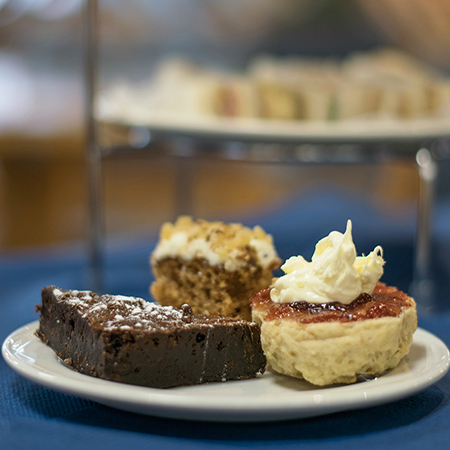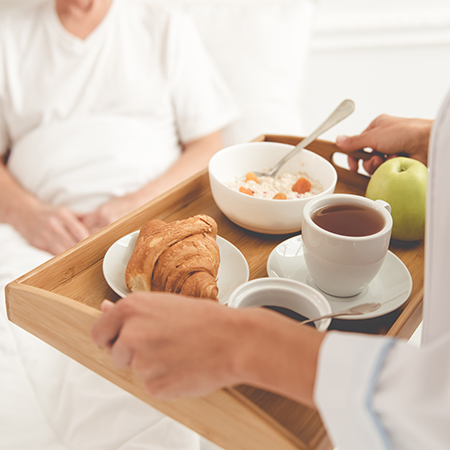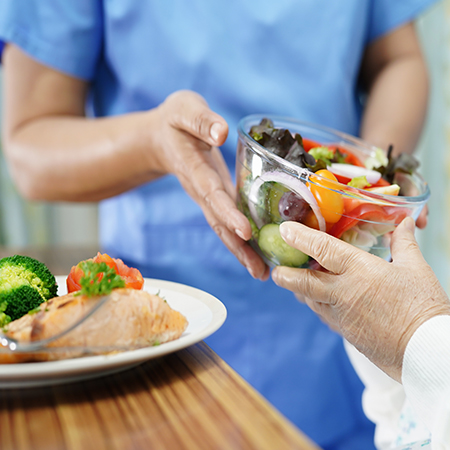Broderick Pooley, Facilities Manager for catering and community and his team at West Suffolk NHS Foundation Trust (WSFT), were shortlisted finalists in the Efficiency & Improvement Award category in our 2020 Awards for the introduction of afternoon teas in the Time Out restaurant at the West Suffolk Hospital in Bury St Edmunds.
This idea originated from a member of the Estates and Facilities team and was led by Brod, his Deputy, Vanessa Theobold and Head Chef, Luke Nobbs. It’s an initiative that puts wellbeing at its heart and focuses on improvement rather than efficiency.
WSFT seeks to improve wellbeing for its staff, visitors and patients at every level and offering an afternoon tea menu as an indulgent treat is a perfect example of that objective. The initiative offers patients, visitors and staff a way to relax away from a clinical working environment.
The catering team put together various options of sandwiches, cakes and scones before embarking on a series of tasting sessions with willing staff volunteers. The result was a clear thumbs-up.
An afternoon tea is a social experience. It brings people together and can fulfill many purposes within a busy healthcare environment:
• It provides a pleasant environment away from the ward or clinical areas for families and friends to catch up
• It's an ideal way to mark a special or momentous occasion such as recovery from illness or an imminent discharge from hospital
• It provides a means of recognition for staff, for example a manager may wish to thank a colleague or team member for their work
• It can be used as a team building exercise away from the distractions of the normal work environment.
The importance of providing an environment for staff and visitors to relax somewhere separate to clinical areas, which can be physically and emotionally demanding, should not be under-estimated. It impacts on the mental wellbeing and efficiency of staff and can also improve the patient and visitor experience and wellbeing.
Offering something as simple as an afternoon tea sends a message to the wider community as well. It tells local people that their hospital Trust cares about the patients and their family and friends who may be using the facilities. It demonstrates that the Trust is innovative and prepared to develop and introduce new ways to enhance the overall patient experience.
“It might sound like an odd thing to offer in a hospital, but sometimes families want to celebrate a new birth, or perhaps the end of some difficult treatment, or even an all clear,” says Brod. "Patients may be unable to go home to celebrate straight away, but they are able to visit our staff restaurant with their family in a more relaxed setting, and that’s why we wanted to be able to offer them a particularly special treat.”
The business model
Afternoon teas generate additional income for the catering department, with every tea purchased contributing a profit. At £6.50 per person they are very reasonably priced.
The menu uses ingredients that are mostly readily available in the hospital kitchen, so there is no need to buy-in specialist products. Turnover of the ingredients and food involved is always rapid, so there is minimal chance of stock wastage which makes it a robust business model. If afternoon tea isn’t purchased, the restaurant will still sell items separately such as sandwiches, cakes and scones.
Anyone hoping to enjoy afternoon tea in the Timeout restaurant must also book two days in advance, which allows the catering team ample time to ensure they have sufficient stock.
Up until March 1, 2020, 230 afternoon teas had been provided by the catering team, with a further 40 booked. These are now being rolled on until it is safe to serve again. Lockdown and the ongoing pandemic have obviously impacted on the service, but this proof of the popularity of the afternoon teas has ensured that they will continue to be offered moving forward.
The benefits of the afternoon tea initiative are difficult to measure but it’s clear that there’s a real effort being made to improve the patient experience. It isn't a difficult service to offer - any Trust with basic catering facilities could introduce an afternoon tea menu to be delivered by the catering team, as could hospitals that outsource their catering services to third parties.
WSFT would encourage other hospitals to consider introducing a similar initiative and the catering team are very willing to share their experiences of the set-up process with others. "After all, any opportunity to improve the patient experience should be actively encouraged," Brod concludes.











